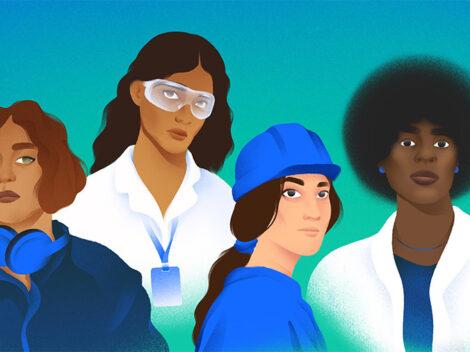Editor’s note: This is part of a series in which we interview active investors in artificial intelligence. Previous interviews were with investors at General Catalyst, Bessemer Venture Partners, Accel, Insight Partners, Index Ventures, Sequoia Capital and Section 32.
Microsoft is the biggest investor in the biggest generative AI company in the world.
But the tech giant’s interest in generative artificial intelligence precedes the public fervor for AI ushered in by OpenAI and its ChatGPT model by several years.
“We were already looking for uses of generative AI before the whole thing exploded,” said Michael Stewart, a partner at M12, Microsoft’s venture fund. Stewart spoke with Crunchbase News about the 7-year-old fund’s investment focus.
Our interview comes at a time when many corporate and strategic venture arms have engaged in a race to invest in the most promising generative AI startups.
Microsoft corporate made a substantial commitment to OpenAI with its first billion-dollar investment in 2019, followed by a $10 billion investment in January 2023 after the launch of GPT 3.5. In total, Microsoft is believed to have made a commitment of $13 billion to OpenAI, which is using the tech giant’s Azure cloud for its build and model deployment. Microsoft has also integrated OpenAI into Bing, Github, Azure and Windows.
This is not the only significant investment Microsoft has made in the space. It has also invested in Inflection AI, Adept AI and Builder.ai in 2023. The software giant’s stock price this year has risen more than 50% in large part due to the value AI brings to the tech ecosystem.
Microsoft CFO Amy Hood told investors that its partnership with OpenAI and others in this sector would add $10 billion in revenue to Microsoft, though she did not specify the time frame.
The moment that drove home the value of this technology for Stewart was not the public launch of OpenAI’s GPT 3.5 about a year ago. It was earlier in 2022, when Jasper connected the power of GPT-3, a prior version, in a highly automated marketing tech platform that got marketers very excited.
“Our job here is to bring what’s called signal back to Microsoft,” he said. Microsoft is the single limited partner in M12.

The team makes investment decisions independently with a focus on Series A- and B- stage investing. “The mandate is to find emerging markets, technologies as they are instantiated in businesses and startups,” Stewart said.
One of those critical investments in AI was the funding it co-led in d-Matrix in April 2022 alongside Playground Global and SK Hynix, which designs chips that aid with the processing of results or inferences from AI models, alleviating the GPU shortage.
A more recent investment is Typeface, a 1-year-old company for enterprise content creation founded by Abhay Parasnis, the previous CPO and CTO at Adobe. Typeface announced two fundings in quick succession: its Series A led by Lightspeed Venture Partners in February of this year, and its Series B at a billion-dollar valuation led by Salesforce Ventures 1 four months later. Parasnis has a vision for enterprise standards using generative AI with respect for data and for the outputs, said Stewart on finding a company that checked all the boxes.
Another portfolio company is Inworld AI. Its founders came from DeepMind and a conversational platform acquired by Google. Inworld creates AI-driven characters within gaming environments to create more compelling experiences.
Stewart was an engineer at chipmaker Applied Materials for the better part of a decade with a background in material science and building computers. He joined Applied Materials’ corporate venture arm nine years ago and got hooked on understanding and supporting deep tech founders. Two years ago, he joined M12, where he had built relationships through joint investing, one notable portfolio company was Syntiant, an edge compute company.
His initial focus at M12 was Web3 and gaming. He navigated opinions about the legitimacy of the value of Web3, he said. Stewart found lots of opportunities on the infrastructure side to invest with Microsoft as a partner to supercharge these early startups.
What M12 looks for
M12 looks for “a clear vision that the founder has about this moment we’re in, and what’s on the other side, because that is certainly the cloudiest thing to see through,” he said.
Second, how does a startup make money? Even if a company does not have revenue, the founder can talk through how it will collect value over time.
“That element of delight is another key thing I look for,” he said. “It’s the difference between me thinking about an application for its peer utility, and then something I pay a lot for.”
Supercharging AI
Earlier this month, Microsoft announced free Azure AI infrastructure to select Y Combinator startups as well as M12 portfolio companies with the intention to expand the program to other accelerators and startups.
Through that effort, Microsoft gains “insights into the infrastructure needs of early-stage AI companies,” Charlotte Yarkoni, the company’s president of commerce and ecosystems, said in a blog post.
Meanwhile, Microsoft’s Intelligent Cloud revenue was $24.6 billion, up 19% for the quarter ending Sept. 30, 2023, compared to the same quarter a year ago. Azure and its other cloud services, a part of this division, grew 29%.
Related Crunchbase Pro query
Further reading:
- The Four Developments Propelling AI Forward: A Conversation With General Catalyst’s Deep Nishar
- A Bessemer Partner On What’s Driving The Firm’s Billion-Dollar Bet On AI
- Accel’s AI Investments Keep The Focus On Applications And Tooling
- Insight Partners Has Invested More Than $4B Into AI. What’s Next?
- Here’s How Index Ventures Is Investing In An Era Where ‘Every Company Will Have AI’
- Inside Sequoia Capital’s Growing AI Portfolio
- How Former Googlers’ VC Firm Invests In Everything From LLMs To AI Doing Drug Discovery
Illustration: Dom Guzman
Search less. Close more.
Grow your revenue with all-in-one prospecting solutions powered by the leader in private-company data.

Stay up to date with recent funding rounds, acquisitions, and more with the Crunchbase Daily.








![Illustration of pandemic pet pampering. [Dom Guzman]](https://news.crunchbase.com/wp-content/uploads/2021/03/Pets-2-300x168.jpg)


67.1K Followers